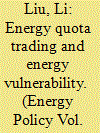|
|
|
Sort Order |
|
|
|
Items / Page
|
|
|
|
|
|
|
| Srl | Item |
| 1 |
ID:
177431


|
|
|
|
|
| Summary/Abstract |
The transition to a digital, decarbonised, and decentralised energy system presents both risks and opportunities for the domestic consumer. Domestic ‘demand-side response’ (DSR), where household electrical consumption adjusts in response to external signals, has been envisioned in different ways with several trials demonstrating that DSR often has variegated and uneven consumer outcomes. This plurality of outcomes raises questions about the ‘winners’ and ‘losers’ of pursuing such policies and thus brings them into the realm of energy justice – a framing that seeks to understand the ethical implications of energy systems. This paper, based on an extensive review of current academic literature, evaluates the normative implications of DSR in relation to the eight principles of energy justice proposed by Sovacool and Dworkin (2015). Whilst there are several ways that DSR may create opportunities for furthering energy justice, there are also multiple risks of injustice, with much depending on how particular DSR programmes are designed and the presence or absence of sufficient policies to mitigate regressive outcomes. Further empirical research is required to better understand the conditions through which DSR can contribute to energy justice. We conclude by offering policy recommendations for those developing DSR or consumer protection policies related to DSR rollout.
|
|
|
|
|
|
|
|
|
|
|
|
|
|
|
|
| 2 |
ID:
183041


|
|
|
|
|
| Summary/Abstract |
This paper takes Sichuan Province (China) as an example to improve the design of energy use rights trading policy (ERTP) with the goal of reducing regional energy vulnerability. The following contributions are made to improve the ERTP: (1) The first step in designing the ERTP is to set the total energy consumption target, and this paper formulates the total energy consumption of Sichuan Province in 2025 with reference to China's 14th Five-Year Plan. (2) This paper adopts the historical egalitarianism, economic egalitarianism, efficiency allocation model and the Game-Equity Fixed Cost Allocation Model (Game-EFCAM) to allocate energy use quotas at the sectoral level. Therein, Game-EFCAM is an allocation model which considers both equity and efficiency. (3) In designing the trading mechanism, this paper exogenizes the price of energy use rights within the quotas and endogenizes (determined by the market) the price of energy use rights outside the quotas. Moreover, this paper adopts a recursive dynamic computable general equilibrium (CGE) model to simulate the effects of different allocation schemes and economic development levels on energy vulnerability. The results show that regional energy vulnerability is minimized under the allocation results of Game-EFCAM. This paper not only improves the ERTP, but also provides a reference for other countries in energy dilemmas.
|
|
|
|
|
|
|
|
|
|
|
|
|
|
|
|
| 3 |
ID:
192720


|
|
|
|
|
| Summary/Abstract |
Energy vulnerability has received sustained attention in global energy research related to energy security and poverty. However, energy quota trading (EQT), which aims to reduce energy consumption and intensity, has the potential to impact energy vulnerability substantially. This study scrutinizes the effect of EQT on energy vulnerability using a difference-in-difference model, relying on a quasi-natural experiment of China's EQT pilot. The findings show that EQT can significantly reduce energy vulnerability by 4.2%, which helps improve energy resilience. In addition, EQT can reduce the proportion of coal in energy consumption, thus reducing energy vulnerability. Finally, the ameliorating effect of EQT on energy vulnerability is particularly pronounced in areas with high resource dependence and low marketization. This research not only expands the understanding of the relationship between EQT and energy vulnerability, but also provides valuable assistance for future EQT policies from pilot to full-scale implementation.
|
|
|
|
|
|
|
|
|
|
|
|
|
|
|
|
| 4 |
ID:
164429


|
|
|
|
|
| Summary/Abstract |
Southwest Indian Ocean (SWIO) islands rely extensively on imported fossil energy to fuel their economic and social activities. This dependency coupled with energy price volatility and possible supply chain disruptions further threaten their sustainable energy future. The concept of energy vulnerability is used as a framework to assess the extent to which SWIO islands are vulnerable to adverse events by means of a composite index of energy vulnerability. It is expressed as the geometric mean of five sub-indicators: access to energy, energy import dependency, primary energy mix diversity, primary energy intensity of gross domestic product (GDP) and energy bill. Energy performances vary across SWIO islands and dimensions contributing the most to energy vulnerability are analyzed. The energy vulnerability index can be used by policy-makers as a benchmarking tool in ‘under-performing’ islands to duplicate best practices and accelerate energy transition in the region.
|
|
|
|
|
|
|
|
|
|
|
|
|
|
|
|
| 5 |
ID:
176828


|
|
|
|
|
| Summary/Abstract |
Rural off-gas households, the highest carbon emitters in the UK, have largely been overlooked in energy scholarship and policy, resulting in limited understanding of the ways in which the socio-material inequalities shape their likelihood of moving into fuel poverty. This paper sets out to fill this knowledge gap by developing a better understanding of the role that non-standard heating technologies play in the thermal comfort practices of rural off-gas households in Wales. Specifically, this paper focuses on ‘traditional’ wood or biomass heating – open fires, enclosed stoves and range-ovens – that are popular and commonplace throughout the UK, particularly in rural households, where they may be utilised for primary or supplementary heating. Findings show that traditional wood/biomass heating, as part of a rural off-grid heating-mix, enables households to respond to financial tensions in meaningful ways that are perceived to make their circumstances better. Additionally, insights highlight the importance of considering the potential conflicts between sustainability agendas that inform contemporary energy policymaking, as well as understanding the existing dynamics of rural off-gas thermal comfort for informing just low-carbon transitions.
|
|
|
|
|
|
|
|
|
|
|
|
|
|
|
|
|
|
|
|
|